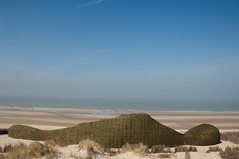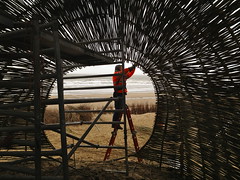
Photo: Greg Eeman
1.
State of the mind, never ending exploration of the space around us. Curiosity. Freedom of the choices. Everything and nothing. Sky and ground. Sound and silence. Light and darkness. Equality of days. Enjoying of time.

Photo: Ketil Born
2.
A nomad is in move.
• He carries all his life in:
- His body
- His backpack
- Something bigger
• The pattern of nomad’s constant movement can be:
a) Cycle based
b) Random
• A nomad whose movement is not cycle based is in constant discovery.
• Nomad’s connection to the environment is based on opposites:
- He is resistant ( A shell protecting from all unexpected and expected unpleasant conditions of the surrounding world.)
• But very depending:
- Climate
- Community
- Food
- Etc.
• A nomad can be lonely or not.
• A nomad can have a goal of his journey.
• A nomad can be a temporary condition.
• A nomad is me.

Photo: Guoda Bardauskaite
3.
Nomad lives without settling for set borders individually in a society connected in motion.

Photo: Valmar Valdmann
4.
A person wandering around installing his / her home to a place giving the best shelter, food etc. living conditions. He / she is constantly prepared to move the “home” in short time and live with the laws of nature.

Photo: Valmar Valdmann
5.
Native nomad populations were nomadic for survival purposes, primal survival. They were following herds and seasons by necessity. However, nowadays, my vision of what being a nomad is has greatly changed. It is an adopted lifestyle pushing us to follow our desires and curiosity. A “Neo-Nomad”, in my opinion, has an attach, an anchor … but escapes to discover, learn and try. Knowledge of yourself and your surroundings is what you have to gain and gather. It might also be a temporary lifestyle choice, like a backpack kind of hut, or some might chose a more permanent way to keep moving around. But in today’s world, there is something truly liberating in the possibility of escaping the ties of the modern world and start exploring.

Photo: Valmar Valdmann
6.
It seems that nomads have not local roots, maybe that is right, because they have the space to change – it is only a question of them where is the mental / spirit home of them.
They have another understanding of a family life; they have to live for each other, not only on birthday dates or Christmas time.
Nomads are the best human parasites in nature; they live with the nature besides for the nature. They are not asking them how achieve more than they needed in the past / not more than the other generations before.

Photo: Valmar Valdmann
7.
Nomads don’t live in a fixed place not because they can’t but because they want and need changing. Is also something that can be moved, small, comfortable, necessary. It can be also fixed but to welcome nomad people. (or not)
Nomad people are the ones who are travelling in a land and take all their belongings with them, even the house.

Photo: Valmar Valdmann
8.
To me, being a nomad is a way of life – on has a nomadic existence. It implies an understanding of the temporal nature of things. I feel it would be hard to live a nomadic life & to place value on permanence. Ones life would be in a constant state of flux as the living arrangement would always invariably change & it would be necessary to appreciate that if one were final happiness. There have been many cultures of nomadic peoples throughout history & of course it is very easy to romanticise such cultures. The constant changes can seem quite adventurous & while they very well may be, I think there also is steely determination behind it. It takes a great strength to believe that the weather will bring what you need where you are heading & also a great strength to believe in yourself & your family & your community that you are making the correct decisions. I think it would be quite hard.

Photo: Greg Eeman
9.
Nomad is a concept about travelling … The liberty to choose your environment., the people surrounding you. It’s something that makes you close to the person with who you are.
It’s a certain concept of liberty. Like a new kind of pirates free to go everywhere (without the stealing).
It’s also a way to be really close with the nature … to know how it works and live an experience in biosis.

Photo: Nikita Wu
10.
When I think of nomads I imagine a tribe of people travelling from one place and adjusting to another, for whatever reasons there may be. Even though they carry with them an air of temporarity, their culture and traditions are more than vivid and are enriched every time the tribe arrives and settles down to a new environment. To me not having a solid base is intriguing as it is very different from the society I was raised in. Through the presence of temporarity they seem have given up the security and developing options a solid base provides and gained a quality of life I admire.

Photo: Nikita Wu
11.
Waldo is nomad. No Made
- Following the game and the seasons to survive
- Change often of site
- Easy to build / deconstruct habitations
- Community / support / family
- Functions for / people different
For me, a nomad community is like a big family composed with people not only linked by blood, but by their ideals of an alternative life.

Photo: Raquel Pastel
12.
Nature. Togetherness. In a big “space”. Survival. Patience. Tranquility – thinking. Strong bonds. Family. Being together in a different way than we normally think people are “social” (being together). Since they are a smaller group of people (family, friends) than those you find in a city for example, they relate in a different way – their lifestyle makes them depending more on each other in order to survive and to have friendships. In this way you have to settle with your “neighbour”, even you like him or not – and you learn to be patient and to understand people. Another part is their relationship to nature – since they have to survive and find food, they need to know how “nature acts”, which also teaches them to respect nature. They depend on their knowledge of the environment and all aspects of nature and the earth. And they learn to respect it and its inhabitants.

Photo: Lill Maria Hansen
13.
Nomad is to live everyday life in accordance with the nature. It is the attitude towards the environment that you are in. For me, nomad people respect nature, they try to read carefully the messages sent to them by the mountains, the rivers, the trees, the animals, the sky, the sun, the moon … which are long forgotten by the modern people.
Nomad is also the attitude towards the changing of life, which is the biggest fear of the people in modern society. Nomad people accept changes and they choose to live their whole life with changes.

Photo: Lill Maria Hansen
14.
Most of people think that nomads have no culture. They move from one place to the next, leaving every time a background that does not belong to them, to reach another one that does not either.
We are used to think that each culture strictly belongs to the place where it was born and developed. It is difficult for us to imagine a culture that can flow and change itself always concerning the environment, different each time and each time dominating but controlled. Instead, that’s the power of nomads culture. It allows them to be challenging the environment and adapting to it, using both the old consistent culture and the really new skills.

Photo: Lill Maria Hansen
15.
Nomad is, I think, a priviledge.
It might be started by necessity in the search of basic resources for survival and become there after the only logical way of live.
It might be triggered by the alienation provoked by the routine of stably structure lives.
But in the end it is limited and controlled by states and borders. In the age of free trade, only money can move freely. People can not. The few that can (we sometimes) are the priviledged elite.
But are we nomads? I’m probably not, however much I might move. So there must be something else to nomadity than mobility … A way of thinking? Flexible adobtable, open? A way of living? Without attachement to material things, without striving for escalating in this hierarchical society? Without an end but with process as and end in itself?

Site:
Participating universities:
Mosjøen College / Construction
Workshop leaders:




















































